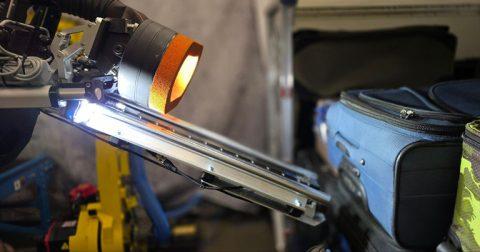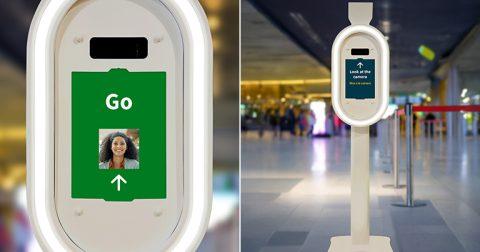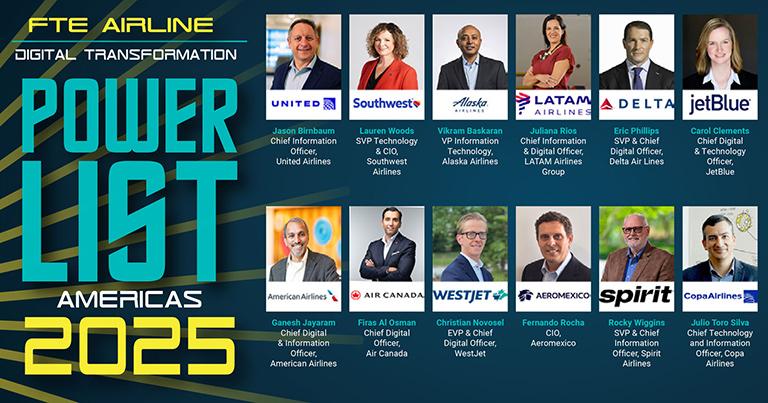
Future Travel Experience is excited to unveil the FTE Airline Digital Transformation Power List Americas 2025. Here we shine a light on those who are pioneering new approaches that have the potential to improve travel for passengers and make the industry safer, more efficient and commercially successful. The Americas edition champions the most transformative change enablers within the airline and airport industry in the Americas for their outstanding efforts to lead how their organisation has embraced digital innovation, reimagined customer experiences and delivered new approaches to operations. In 2025, FTE is more committed than ever to supporting digital transformation efforts in the industry through the FTE Digital, Innovation & Startup Hub, which is a truly unique community designed specifically for the individuals and organisations who are at the forefront of digital transformation and innovation in aviation. The FTE Hub is focusing on three key themes this year – Artificial Intelligence (AI), Robotics, and Internet of Things (IoT) – and in alignment with that, the Power List recognises those that are leading key digital transformation efforts. In recognition of their leadership and achievements, each member of the Power List will receive a complimentary “Golden Ticket” to FTE Global – renowned as the “CES of Aviation” – taking place in Long Beach, California, on 9 to 11 September 2025. After extensive research into each candidate, we believe the following 12 executives have been at the forefront of innovation, driving transformational change for their organisations and the wider industry.
Jason Birnbaum, Chief Information Officer, United Airlines

As Chief Information Officer, Jason Birnbaum leads the team driving digital technology efforts for United Airlines and is responsible for all customer-facing tech. United – a Corporate Partner of the FTE Digital, Innovation & Startup Hub – relentlessly champions using innovation and technology to deliver a best-in-class customer experience.
Migration to the cloud, in partnership with Amazon Web Services, is supporting innovation using artificial intelligence (AI), machine learning and Internet of Things (IoT) capabilities, for example, while advancing efforts to transform the travel journey for customers through digital technology.
AI has been a long-term strategic investment for United, rather than a recent initiative. The airline has ambitious plans for generative AI (GenAI) and has already launched United ChatGPT for secure employee experimental use, as well as GenAI tools to assist in giving travellers real-time updates during flight delays which has boosted customer satisfaction.
United also recently launched new, personalised mobile app features designed to make catching connecting flights easier. Customers with connecting flights at United’s U.S. hub airports can now access a special section of the app that includes a countdown to connecting flights, customised turn-by-turn directions to their connecting gate with estimated walk times, real-time flight status updates, tips for longer layovers, and notifications if United’s ConnectionSaver technology has been activated to hold the plane for them. These features are exclusive to the United mobile app and expand on the airline’s ConnectionSaver AI-powered tool.
As part of its innovation strategy, United is also exploring areas such as robotics & automation to drive a smoother travel experience, with Kristen Berndt, Director, Below-the-Wing Strategy & Innovation, United Airlines, playing a key role in these efforts. One example is efforts to transform baggage handling, with the airline exploring autonomous baggage carts, robotic solutions for loading and unloading bags, automated aircraft pushback solutions, and more. One robotics initiative already underway is United’s collaboration with WHILL, with the aim of making airport terminal transport more accessible using autonomous personal mobility devices.
Many members of the United team are contributing to the airline’s comprehensive digital transformation initiatives, but as CIO Jason Birnbaum is recognised on the Power List for his tech-focused leadership.
Hear more from United Airlines at FTE Global – the “CES of Aviation” taking place in Long Beach, California, on 9 to 11 September 2025. Scott Kirby, CEO, United Airlines, will deliver an exclusive keynote address at FTE Global 2025. Meanwhile, Kristen Berndt, Director, Below-the-Wing Strategy & Innovation, United Airlines, is participating in ‘The FTE Robotics & Autonomous Vehicles Symposium’; Sagi Varghese, Managing Director, Airport Operations & CSD Technology, United Airlines, is joining ‘The Technology Leaders Conversation’; Kushal Pasari, Director of GenAI & ML Engineering, United Airlines, is speaking in ‘The FTE AI Symposium – Part 2: A deep-dive into Agentic AI and the move towards Artificial General Intelligence’; and Kaveh Dabiran, Managing Director, Corporate Real Estate Planning & Development, United Airlines, is participating in a session titled ‘The future of business & commercial strategies for airports – are we at the threshold of airports evolving to become digital companies that run experiential businesses, and what would the new business models and organisational structures be behind that?’
Explore the full FTE Global 2025 conference agendas here >> Register for FTE Global 2025 >>
Lauren Woods, Senior Vice President Technology and Chief Information Officer, Southwest Airlines
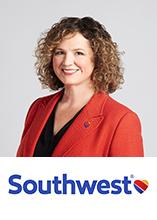
Lauren Woods, Senior Vice President Technology and Chief Information Officer, leads the Southwest Airlines team committed to providing the most reliable, secure, and effective technology solutions in the airline industry.
Key initiatives across Southwest’s technology department include establishing the airline’s Amazon Web Services cloud infrastructure, creating a new development, and delivery platform for complex application ecosystems. Woods and her team are also heavily focused on the transformation of Southwest’s enterprise data platforms that drive the company’s data science, analytics, optimization, and system integrations.
Southwest – a Corporate Partner of the FTE Digital, Innovation & Startup Hub – believes robotics and artificial intelligence (AI) offer immense potential to revolutionize the airline industry. From enhanced staffing and utilization decisions to AI-driven predictive maintenance, these technologies streamline operations, reduce costs, and enhance safety. Southwest is strategically harnessing both traditional AI and generative AI. An example of an application of traditional AI involves predicting flight risks and furnishing actionable insights and alerts for the airline’s Operations team. This empowers them to effectively manage and recover from operational disruptions. The airline is focused on continuing to build a strong data foundation to enable faster, smarter decision-making across operations, driving improvements like quicker gate turnarounds.
Southwest Airlines is also harnessing the power of the Internet of Things (IoT) to enhance operational efficiency, safety, and the passenger experience through real-time monitoring and automation and to streamline control processes with its Ground Operations teams. Understanding the critical importance of data to operations, Southwest is actively exploring the significant role IoT can play in data collection across all facets of its operations.
While many members of the Southwest team are contributing to its digital innovation efforts, Lauren Woods, Senior Vice President Technology and Chief Information Officer, is recognized for her leadership role in a robust transformation built on modern cloud infrastructure, AI, IoT, and other advanced tech, all while retaining the airline’s customer-first ethos.
Hear more from Southwest Airlines at FTE Global – the “CES of Aviation” taking place in Long Beach, California, on 9 to 11 September 2025. Sree Samudrala, Director of Artificial Intelligence & Automation, Southwest Airlines, is participating in ‘The FTE AI Symposium – Part 2: A deep-dive into Agentic AI and the move towards Artificial General Intelligence’, and Andrea Goodpasture, Managing Director- Airport Affairs, Southwest Airlines, is speaking in a session titled ‘The future of business & commercial strategies for airports – are we at the threshold of airports evolving to become digital companies that run experiential businesses, and what would the new business models and organisational structures be behind that?’ Meanwhile, Kevin Kleist, Head of Emerging Trends, Southwest Airlines, is participating in three sessions titled ‘How do we now revolutionise the gate and boarding experience, and other key airport pinch-points?’, ‘Crowdsourced Safety: What 4,400 Photos Can Teach AI (and us)’, and ‘Pilot stories: What are hard lessons learned, and secrets, to a successful innovation journey?’
Explore the full FTE Global 2025 conference agendas here >> Register for FTE Global 2025 >>
Vikram Baskaran, Vice President Information Technology, Alaska Airlines

Alaska Airlines has a long history of innovation, including being the first airline in the U.S. to sell a ticket and check-in a customer online. This tradition has continued over the years through the implementation of innovative technology solutions in support of the carrier’s mission of “creating an airline people love”.
As Vice President, Information Technology Services, Vikram Baskaran leads the team responsible for Alaska Airlines’ digital transformation and innovation, leveraging cutting-edge technologies to streamline operations, enhance cybersecurity, and foster cross-functional collaboration.
At the FTE World Innovation Summit in Pittsburgh in May, Alaska Airlines unveiled a transformative new vision for future gate experiences, with plans to revolutionise pre-flight operations with automation, artificial intelligence (AI), and human-centred design. This builds on Alaska’s dynamic new approaches that are driving a sub 5-minute lobby experience across its airport network, while its Mobile Verify program, powered by Airside, enables travellers to verify their passport from home.
Meanwhile, the airline is embracing robotics and automation, preparing for what it calls the ‘Proactive Era’: where robotics enable it to detect and prevent irregular operations, where Virtual Travel Assistants guide guests every step of the way, and customer service becomes ‘super-charged’ with guest insights delivered to agents through Augmented Reality (AR)-enabled wearables. Alaska Airlines envisions a future where automation and high levels of guest care work hand-in-hand. Indeed, when it comes to baggage operations, for example, Alaska has already collaborated with Pattern Labs to develop pioneering automated dispatch tools to better handle tight transfer windows for connecting bags.
While myriad members of the Alaska Airlines team – including notably Bernadette Berger, Director of Innovation; Kristin Olsen, Director of Product Management, Travel Experience Guest Digital Technology, and many more – are contributing to its comprehensive digital innovation efforts, as Vice President Information Technology, Vikram Baskaran is recognised on the Power List for his tech-focused leadership.
Hear more from Alaska Airlines at FTE Global – the “CES of Aviation” taking place in Long Beach, California, on 9 to 11 September 2025. Natalie Randall, Day of Travel Experience Manager, Alaska Airlines, is participating in ‘The APEX/FTE Accessibility Symposium – let’s go above and beyond what is required’. Nicole Hodges-Austin, Innovation Program Manager, Alaska Airlines, is speaking in a session titled ‘Pilot stories: What are hard lessons learned, and secrets, to a successful innovation journey?’ Meanwhile, Gus Naughton, Principal Software Engineer – Innovation, Alaska Airlines, is participating in two sessions. Naughton will deliver a joint presentation alongside Kellen Schroeter, CEO & Co-Founder, Pattern Labs, titled ‘What is the in-depth story behind Alaksa Airlines becoming the first airline to automate dispatch on the ramp with AI?’ He is also speaking in a session titled ‘How do we now revolutionise the gate and boarding experience, and other key airport pinch-points?’
Explore the full FTE Global 2025 conference agendas here >> Register for FTE Global 2025 >>
Juliana Rios, Chief Information & Digital Officer, LATAM Airlines Group
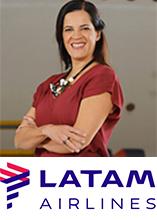
As the largest airline group in South America, LATAM Airlines has placed technology and innovation at the heart of its passenger experience strategy.
In the past few years, the airline has been investing in technology such as biometrics, self-service, and Augmented Reality, as well as implementing cutting-edge technology inflight. Juliana Rios, Chief Information & Digital Officer, is leading the LATAM teams driving digital transformation efforts while maintaining the successful operation of applications and infrastructure.
Artificial intelligence (AI) is central to LATAM’s ongoing digital transformation and last year it launched the ‘70/50/2 Project’, which aims to achieve 70% of customer service requests resolved by conversational AI and 50% of interactions managed proactively, within a 2-year timeframe. This approach not only transforms LATAM’s relationship with its customers, but also the way the airline operates internally. LATAM has implemented ‘AmelIA’ – a generative AI platform developed in collaboration with OpenAI, for its 35,000 employees across six countries, allowing teams to optimise their time and focus on strategic tasks.
As part of its investment in emerging technology, LATAM has also collaborated with NTT DATA to develop and deploy Virtual Reality immersive technologies to optimise cabin crew training.
Meanwhile, digital transformation extends to the onboard experience – LATAM recently announced a $60 million investment in state-of-the-art inflight connectivity developed by Viasat, as the airline aims to “combine innovation and active listening to deliver a modern, connected experience”.
Eric Phillips, SVP & Chief Digital Officer, Delta Air Lines
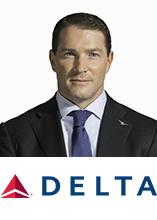
As SVP & Chief Digital Officer, Eric Phillips leads the Delta Air Lines teams focused on delivering digitally enabled, personalised, seamless, and premium experiences for customers. Delta continues to innovate and modernise digital tools to put the power of flexibility, control, and simplicity at the core of the travel experience. Phillips partners with leaders across the enterprise to accelerate cross-functional initiatives and drive a multi-disciplinary approach to enhancing customer interactions with Delta’s digital platforms and channels.
As a key part of its CX strategy, Delta aims to take personalisation to the next level. It recently launched the enhanced Fly Delta app version 7.0 which provides real-time flight updates, personalised notifications, seamless travel documentation support and more – giving customers greater control through expanded self-service features and a more connected travel experience. The goal is for the Fly Delta app to be the ultimate travel companion, enhancing every step of the customer journey to ensure seamless and connected travel.
Building on this, the airline’s tech-forward vision for the future of travel was vividly presented at CES 2025, where Delta Concierge was introduced. This involves leveraging Delta-centric artificial intelligence (AI) for an elevated human touch to supercharge the customer experience. Delta Concierge is built into the Fly Delta app. The experience uses generative AI to create seamless and personalised experiences, while making a customer’s journey easier, with multi-modal transportation options offered through Delta partners Uber and Joby.
Delta is also unlocking a simpler, more personalised airport experience in partnership with tech startup Misapplied Sciences, through the PARALLEL REALITY technology. Customers travelling through Detroit Metropolitan Airport can experience this innovative tech, which allows up to 100 customers to each see personalised flight information tailored to their unique trip on a single, shared digital screen, simplifying their journey through the airport at a glance.
As technology evolves, customers expect their travel experience to adapt and evolve with them. Delta is facilitating that with a comprehensive digital transformation strategy that is intuitive, contextual and seamless.

FTE Global – renowned as the “CES of Aviation” – takes place in Long Beach, California, on 9 to 11 September 2025. Co-located once again with APEX/IFSA Global EXPO, it will be the networking opportunity of the year, ensuring you get the best of the airport and inflight realms under one roof. The inspirational conference agenda features presentations from a number of the leading airlines listed here, including United Airlines, Southwest Airlines, Alaska Airlines and Spirit Airlines, plus many more speakers from inside and outside the industry.
Carol Clements, Chief Digital & Technology Officer, JetBlue

JetBlue is committed to digital transformation, with the team led by Carol Clements, Chief Digital & Technology Officer, JetBlue, overseeing the strategy, vision and implementation of technology solutions that align with the airline’s business model to offer digital innovation and consistent service, and maximise investment. Prior to JetBlue, Clements’ extensive experience includes 11 years at Southwest Airlines in a variety of leadership roles. During her time there, she oversaw technology initiatives supporting Southwest’s first-ever expansion to international markets, the launch of the All-New Rapid Rewards loyalty program, and the modernisation of Southwest’s e-commerce channels.
JetBlue’s digital transformation strategy is focused on using technology to create a more seamless, personalised, and efficient travel experience. The airline is, for example, actively using artificial intelligence (AI) and machine learning to personalise customer interactions, optimise operations, and improve decision-making processes. This includes the recent implementation of generative AI through the latest version of its virtual agent – Amelia 2.0.
Last year, JetBlue also extended its partnership with FLYR, using AI-driven travel intelligence to deliver real-time insights. Utilising cutting-edge deep learning technology, the cloud-native decision intelligence platform offers automated, AI-powered revenue management capabilities. This is helping maximise opportunities across the business, enabling quick, precise capacity plans and pricing adjustments.
JetBlue is also innovating inflight. Last year, it launched a personalised inflight experience platform – Blueprint by JetBlue – that provides more customisability across the travel journey. From planning the journey to arriving at the destination, Blueprint is designed to help customers stay connected with new features from take-off to touchdown. Onboard, customers can easily enjoy movies with their friends and family through watch parties, allowing up to six travellers to watch the same film or TV show at the exact same time. More features include the ability to pick up where you left off, so you never miss an episode or ending, and save your favourite titles and settings to create a personal experience.
JetBlue’s commitment to digital transformation reflects a broader vision: to lead with innovation while enhancing the customer journey at every touchpoint. As the airline continues to evolve, its tech-forward strategy positions it at the forefront of modern air travel.
Ganesh Jayaram, Chief Digital and Information Officer, American Airlines

As the Chief Digital and Information Officer for American Airlines, Ganesh Jayaram leads the team responsible for all technology efforts at the world’s largest airline, including software development, infrastructure, operations and security. The tech team provides the roadmap that defines the role technology plays in customer and team member experiences and drives the next generation of strategic initiatives, including transition to the cloud, advanced analytics, machine learning, and the advancement of DevOps tools and principles.
Over the past few years, American has focused on driving an enterprise-wide tech-first mindset to build industry-leading digital products both for its team members and its customers. User-friendly technology is part of our daily life and American believes that should extend into what customers experience when they travel. With a renewed focus on the customer experience, American has ramped up its digital capabilities – for example, it recently introduced a redesigned mobile app, which has been revamped to fulfil customers’ most-requested features, creating a one-stop-shop for all travel needs with increased personalisation.
American’s team is also channelling its tech-first mindset to support customers when weather hits. The airline has this summer been testing a new conversational chat assistant that leverages generative AI to help customers rebook if their flight has been delayed or cancelled due to weather.
Meanwhile, behind the scenes American continues to leverage tech for enhanced decision-making. The airline is testing new technology at DFW and CLT – two of its biggest hubs with an outsized volume of connecting travellers. This tech identifies departing flights with customers who might miss their connection and looks at data to determine if it can propose a short hold to save customer connections.
Beyond in-house solutions, the American team is also partnering with local and federal agencies to enhance the customer experience, including the recently announced Touchless ID for AAdvantage members.
Firas Al Osman, Chief Digital Officer, Air Canada
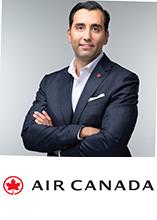
Firas Al Osman was appointed Chief Digital Officer at Air Canada in September 2024. He is responsible for the development and implementation of a comprehensive digital transformation strategy at Air Canada. Key areas of focus include enhancing the customer experience and driving efficiency and innovation, as well as improving operational processes and performance.
Air Canada is committed to enhancing its digital capabilities and providing a seamless and engaging experience across all customer and employee touchpoints. Al Osman brings a strategic mindset to uplift the organisation’s digital capabilities.
Artificial intelligence (AI) is the overarching technology underpinning Air Canada’s innovation efforts. Indeed, the airline has over 75 employees across the fields of data science and operations research, machine learning and data engineering, who are actively building AI solutions in-house. Some of the AI solutions developed at Air Canada include tools to optimise the flying schedule, as well as improve maintenance planning. The airline’s vision extends beyond conventional automation, with plans to potentially extend its premium concierge service to all customers through AI technology.
Air Canada is on a major innovation push both below the wing and in the terminal. It is building an ecosystem supporting digital transformation efforts and embracing technologies such as robotics, AI and the Internet of Things (IoT). A key project is the launch of digital identification, becoming the first airline in Canada with approval to offer passengers the option of using facial recognition technology to confirm identification. Digital identification is a single enrolment feature on the Air Canada app. Biometric data is encrypted and stored only on the traveller’s mobile phone.
The digital transformation strategy encompasses several key infrastructure initiatives, including a comprehensive WiFi rollout across the airline’s fleet. 80% of Air Canada’s aircraft will be WiFi-enabled by Q3 2025, with full implementation across all 350 aircraft by year-end.
Air Canada has this year partnered with Lufthansa Systems to implement solutions that empower employees with advanced tools designed to deliver a superior customer experience. Simultaneously, Lufthansa Systems has migrated Air Canada’s solutions to the Global Aviation Cloud, with the aim of allowing the airline to leverage tech innovations while focusing on its core business.
Christian Novosel, EVP & Chief Digital Officer, WestJet

WestJet continues to invest in enterprise-wide digital products and solutions for its customers and employees. Christian Novosel, EVP & Chief Digital Officer, leads the team responsible for the digital transformation of the WestJet Group with a focus on enhancing operational efficiency as well as the employee and customer experience. In addition to the airline’s digital roadmap, data science, advanced analytics, and business intelligence agenda, Novosel and his team drive the delivery and evolution of WestJet’s digital products, including its website and apps, and direction of all major projects through the Group Project Management Office.
WestJet is transforming the travel journey, empowering passengers with more self-service capabilities and intuitive interfaces. From streamlined baggage processes to enhanced digital disruption management tools, the airline’s technology investments are designed to simplify internal operations while elevating the overall travel experience, ensuring seamless journeys.
WestJet and TELUS last year formed a partnership designed to revolutionise the onboard experience, including free inflight WiFi, delivered by Starlink. The airline has also partnered with Silicon Valley-based Plug & Play’s Travel and Hospitality program, leveraging artificial intelligence (AI) and machine learning (ML) across the business. As WestJet focuses on radical digitisation, this partnership is accelerating efficiencies and cost savings, though AI and ML-driven automation efforts, as well as improving guest experience across all touchpoints.
WestJet utilises AI in several ways – notably with its AI-powered chatbot, Juliet, and through partnerships for dynamic pricing and operational efficiency. The airline is also using generative AI to advance automated, strategic decision-making and revenue generation, leveraging Fetcherr’s Large Language Model.
Meanwhile, WestJet is the anchor airline of Calgary’s Aerospace Innovation Hub, which launched last year, providing opportunities for startups to develop world-class aerospace technology and apply their solutions to real-world airline scenarios.
Fernando Rocha, CIO, Aeromexico

Mexico’s flag carrier, Aeromexico, is leveraging cutting-edge tools and technologies as it continues its digital transformation. The team led by Fernando Rocha, CIO, Aeromexico, is focused on modernising applications, transitioning to the cloud, delivering exceptional customer experiences, fostering innovation, and achieving operational efficiencies.
Artificial intelligence (AI) is a cornerstone of Aeromexico’s digital strategy. For example, the airline recently announced a strategic partnership with Sabre to enhance personalisation and maximise revenue, using new advanced AI-driven solutions. Real-time data and AI enable Aeromexico to personalise ancillary offers based on traveller behaviour, helping boost revenue and elevate the passenger experience. Indeed, personalisation is central to the airline’s strategy – as part of this it strives to provide omnichannel customer service and has introduced conversational AI to its ‘Aerobot’ digital agent in partnership with Amelia. The aim is to offer a seamless customer experience across multiple channels, including web, mobile, and social media. Utilising conversational AI is enabling more tailored interactions with each customer, providing relevant information and recommendations based on their preferences and previous interactions.
Other key members of the Aeromexico team include Andrés Castañeda, Chief Digital and Customer Experience Officer & EVP, who is spearheading inflight innovations such as the advanced inflight connectivity being delivered in partnership with Viasat. The onboard digital experience has also been enhanced in partnership with Touch, with pioneering inflight entertainment offerings and optimisation strategies designed to elevate the passenger experience. The inflight experience has been further augmented with a new Aeromexico app – AMX 2.0.
Rocky Wiggins, SVP & Chief Information Officer, Spirit Airlines
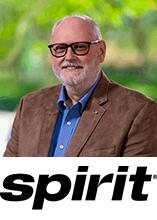
Spirit Airlines has established itself as one of the leading ultra-low-cost carriers in the U.S. Technology plays a central role in supporting the airline’s continued growth, with innovations led by Rocky Wiggins, Senior Vice President and Chief Information Officer. Under his leadership, Spirit is championing bold, guest-focused digital initiatives designed to position the airline at the forefront of technology adoption in the aviation sector.
Spirit is undergoing a significant digital transformation aimed at enhancing operational efficiency and elevating the customer experience. This includes investing in emerging technologies, upgrading its mobile app, and deploying artificial intelligence (AI)-powered self-service solutions. These efforts are designed to streamline processes, empower frontline employees, and create a more seamless and personalised travel experience.
One standout initiative is Ariel, an AI-based virtual assistant designed to support Spirit flight attendants and assist customers with questions related to their journey or inflight services.
As part of its “pledge to invest in the guest,” Spirit is also focused on biometrics, developing the nation’s first biometric photo-matching solution for domestic air travel in the U.S. The airline started from scratch by defining an entirely new set of protocols in conjunction with the Transportation Security Administration (TSA). This cutting-edge solution, combined with automated self-bag drop kiosks, is designed to reduce physical touchpoints and expedite the airport experience.
Meanwhile, Spirit continues to improve its mobile app, evolving it into a dynamic, user-friendly platform that anticipates traveller needs. Customers can manage baggage, choose seat assignments, purchase add-ons like priority boarding and expedited security, and complete check-in – all within the app. Looking ahead, Spirit’s vision is to enable passengers to manage their entire journey digitally, with upcoming features like interactive airport maps and location-based points of interest.
Hear more from Spirit Airlines at FTE Global – the “CES of Aviation” taking place in Long Beach, California, on 9 to 11 September 2025. Jason Fogelman, Senior Director – Airport & Inflight Strategy & Ops Support, Spirit Airlines, is participating in two sessions – one focused on ‘Advancing Digital Identity & Seamless Travel Efforts’ and one titled ‘Crowdsourced Safety: What 4,400 Photos Can Teach AI (and us)’. Meanwhile, Dana Shapir Alviene, Senior Vice President Inflight & Airport Experience, Spirit Airlines, is speaking in a session focused on ‘Understanding the trends, and factors, that will impact customer journeys & future expansion strategies of airports and airlines’.
Explore the full FTE Global 2025 conference agendas here >> Register for FTE Global 2025 >>
Julio Toro Silva, Chief Technology and Information Officer, Copa Airlines

As Chief Technology and Information Officer, Julio Toro Silva leads the digital modernisation of Copa Airlines, combining innovation with pragmatism to simplify customers’ journeys and empower its workforce.
Copa Airlines has an ambitious expansion and investment roadmap for 2025, with a strong focus on innovation. The airline is placing personalisation at the forefront of its digital transformation strategy, with its new app providing passengers with a seamless and tailored experience – from planning their trip to navigating unexpected changes and much more. As part of these efforts, Copa Airlines has also partnered with Smartvel to offer artificial intelligence (AI)-powered real-time travel information and personalised services to travellers, including up-to-date health and visa requirements, as well as personalised information on baggage and more.
Copa Airlines is further exploring the potential of AI, GenAI, and data analytics technologies to enhance both the customer experience and operational performance, in partnership with companies including Amazon Web Services (AWS). From AI-driven chatbots for customer support to predictive models for flight scheduling and maintenance, these technologies are helping Copa Airlines streamline operations and make more informed decisions. The use of GenAI is also opening up new possibilities for personalisation to enhance passenger engagement and satisfaction.
Alongside his role as Chief Technology and Information Officer at Copa Airlines, Julio Toro Silva is also Vice Chair of the IATA Digital Transformation Advisory Council and is, therefore, recognised on the Power List for his tech-focused leadership role within the industry.


